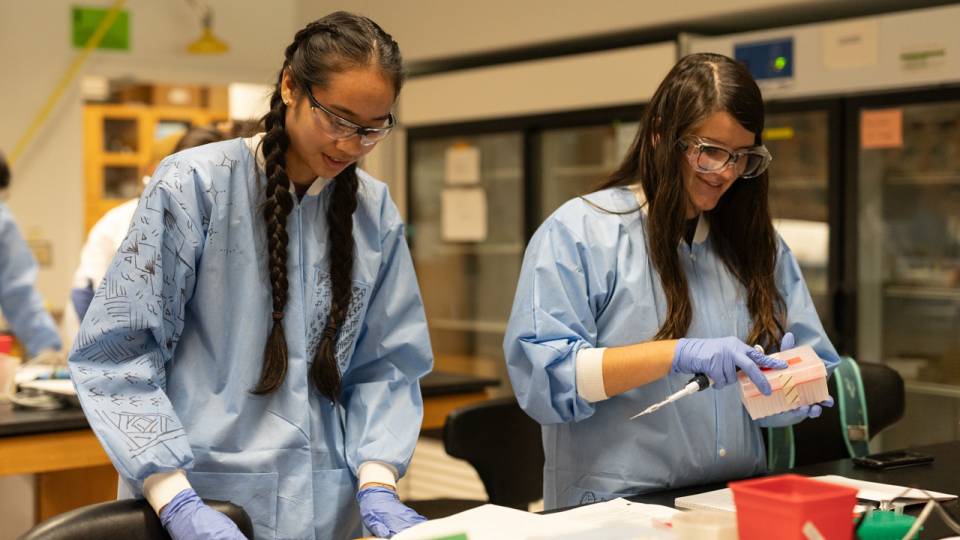Jenny Greene
Jenny Greene, a professor of astrophysical sciences and the director of Princeton’s Prison Teaching Initiative, was awarded the prestigious Presidential Award for Excellence in Science, Mathematics, and Engineering Mentoring (PAESMEM) by President Biden on Jan. 13. The award, established in 1995, honors outstanding mentors who encourage the next generation and help develop a science and engineering workforce that reflects the country’s diverse talents, according to the White House announcement(Link is external).
“The real heroes are the incarcerated students, and I’m excited to have the opportunity to shine a light on their work that this medal provides,” said Greene. “I am honored to work with people with such bravery and perseverance.” Greene is among the 25 individuals and five organizations recognized in this year’s presidential STEM mentoring awards.
“It’s such great news that Jenny has received this award,” said Gillian Knapp(Link is external), an emeritus professor of astrophysical sciences who received the PAESMEM for her own work with PTI in 2018. Knapp co-founded(Link is external) the initiative in 2005 with Greene and Mark Krumholz, who were both then postdoctoral fellows in astrophysics. What began as a small pilot project teaching math is now one of the largest prison educational programs in the country. In 2017, PTI became part of the Princeton University McGraw Center for Teaching and Learning.
PTI “has become a flagship outreach initiative for Princeton,” wrote Cole Crittenden, Princeton’s vice provost for academic affairs, in a letter of recommendation for the award. “Jenny’s background in and focus on STEM education as an essential component of PTI means that incarcerated students receive educational access to fields that will prepare them for some of the most pressing questions and opportunities of the 21st century.”
“Jenny is such an effective advocate and mentor not only because of her moral consistency and clarity of vision, but also because of her unbridled passion for teaching,” said Jill Stockwell, the associate director of PTI, in another letter of recommendation for Greene. “Nearly 20 years into her work with PTI, Jenny can still be found regularly in the prison classrooms where we teach, covered in chalk and tutoring pre-algebra to groups of enthusiastic students.”
Since Greene taught her first math course “inside” in 2005, the Prison Teaching Initiative has grown to offering incarcerated students up to 40 courses per year — in the humanities, social sciences, mathematics, and physical sciences including laboratory courses — in up to six New Jersey Department of Corrections institutions.
Starting in 2021, with a virtual program, PTI has also developed summer internship programs(Link is external) for formerly incarcerated college students, recently featured on WHYY(Link is external).
The largest cohort of volunteer teachers are usually graduate students. Through PTI, Greene has mentored a new generation of STEM educators, while simultaneously giving incarcerated and formerly incarcerated students the tools to critically engage with the world of science, mathematics and technology, Knapp said.
“As well as its role in education for incarcerated people, PTI has provided serious teaching and mentoring opportunities for large numbers of young scholars at Princeton and other institutions,” Knapp said. “In several cases it was a key factor in their decision to come to Princeton, and sometimes, in the course of their subsequent career; it’s good to see this reflected in the University’s strong support.”
The incarcerated students can earn credits toward an A.A. degree in Liberal Arts from Raritan Valley Community College (RVCC) or a B.A. in Justice Studies from Rutgers School of Criminal Justice. Upon their release, many choose to pursue further education.
This fall, Greene will teach a new coding-based astrophysics course at Princeton, targeted to non-majors, and next spring she’ll teach the same course for PTI. For the first time, her incarcerated students will get a Princeton credit on their transcripts — the result of a years-long coordination between PTI, the Princeton administration and the Department of Corrections.






